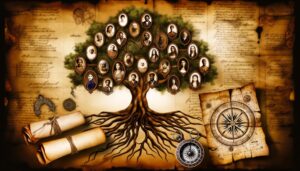Leah Name Meaning and Origin
The name Leah has profound biblical roots, originating from the Hebrew ַלֵאָה (Le'ah), meaning 'weary' or 'tired.' As detailed in the Book of Genesis, Leah was the first wife of Jacob and the mother of six tribes of Israel, symbolizing perseverance and vulnerability. Her story reflects themes of labor and emotional depth, resonating through Judaic texts.
Historically significant, Leah is recognized in both the Hebrew Bible and the Quran. The name remains popular, often ranking highly in contemporary baby name lists, attributed to its simplicity and cultural resonance.
To further understand Leah's timeless appeal, consider her extensive literary and cultural representation.

Key Takeaways
- Leah is a Hebrew name meaning 'weary' or 'delicate.'
- Leah is a significant biblical figure, the first wife of Jacob and mother of six tribes of Israel.
- The name Leah appears in both the Old Testament and the Quran.
- Leah has consistently ranked among the top 50 baby names in the United States.
- The name Leah is valued for its simplicity, elegance, and enduring historical significance.
Biblical Roots
The name Leah finds its earliest mention in the Hebrew Bible, specifically in the Book of Genesis, where she is introduced as the first wife of Jacob and the mother of six of the twelve tribes of Israel. Historical accounts describe Leah as the elder daughter of Laban, who deceitfully married her to Jacob instead of her younger sister, Rachel.
Leah's significance extends beyond her familial role; she is central to the lineage of the Israelite tribes: Reuben, Simeon, Levi, Judah, Issachar, and Zebulun. Her narrative, deeply embedded in the patriarchal history, provides essential context for understanding the genealogical and cultural heritage of the Israelites. This foundational story in Genesis underscores Leah's pivotal role in biblical history.
Meaning in Hebrew
In Hebrew, the name Leah (לֵאָה) is traditionally interpreted to mean 'weary' or 'tired,' reflecting its biblical roots. The name carries significant weight in Judaic texts, where Leah, the first wife of Jacob, plays an essential role.
Common Hebrew interpretations also suggest connections to themes of labor and perseverance, which are evident in her story within the Book of Genesis.
Biblical Significance
Derived from the Hebrew word 'Le'ah,' meaning 'weary' or 'delicate,' the name Leah holds significant historical and spiritual importance in biblical contexts. Leah is a key figure in the Old Scripture, specifically in the Book of Genesis.
She is known for:
- Matrimony to Jacob: Leah was the first wife of Jacob, married through Laban's deception, which led to subsequent familial and tribal developments.
- Motherhood of Tribes: Leah bore six of Jacob's twelve sons, who would become the progenitors of the Tribes of Israel, including Judah, whose lineage heralds King David and Jesus Christ.
- Symbolic Value: Leah's story highlights themes of perseverance and divine favor despite human adversity, making her a symbol of resilience in religious teachings.
This multifaceted role underscores Leah's enduring legacy in biblical history.
Common Hebrew Interpretations
Often rendered as 'delicate' or 'weary,' Leah's name in Hebrew carries nuanced interpretations that reflect both physical and emotional states, deeply embedded in its etymological roots.
Derived from the Hebrew word 'לאה' (le'ah), which means 'weary' or 'tired,' it is thought to convey a sense of exhaustion or frailty. Historical texts and linguistic analyses suggest that the name also embodies notions of tenderness and vulnerability.
In the context of the Torah, Leah is described as having 'soft' or 'weak' eyes, which some scholars interpret as a physical manifestation of her name's meaning.
Therefore, the name Leah encapsulates a rich blend of emotional and physical nuances, offering a profound understanding of its historical and cultural significance.
Historical Significance
How did the name Leah, first appearing in ancient biblical texts, come to hold such enduring historical significance throughout various cultures and eras? Leah, a prominent figure in the Hebrew Bible, was the first wife of Jacob and mother to six of the twelve tribes of Israel. This foundational role cemented her name's perpetuation in religious and cultural contexts.
Religious Texts: Leah's mention in both the Old Scripture and the Quran underscores her significance across Judaism, Christianity, and Islam.
Cultural Traditions: Various cultures adopted the name Leah, recognizing its historical weight and attributing virtues like resilience and motherhood.
Historical Records: Archaeological findings and ancient manuscripts reference Leah, reinforcing her enduring legacy through millennia.
These factors collectively underscore Leah's historical importance.
Leah in Literature
Leah, a prominent figure in biblical literature, has been referenced extensively in both classical and contemporary works, underscoring her enduring influence.
In classic novels, authors like George Eliot have used the name Leah to embody certain character traits and thematic elements.
Modern fiction continues this tradition, with writers incorporating Leah to evoke historical and symbolic resonance.
Biblical References to Leah
In the Biblical narrative, Leah, the first wife of Jacob, is a significant figure whose story unfolds mainly in the Book of Genesis, chapters 29 through 49. Leah's life is marked by several pivotal events:
- Marriage to Jacob:
Deceived by her father Laban, Jacob marries Leah instead of her younger sister Rachel, whom he initially desired (Genesis 29:23-25).
- Motherhood:
Leah bears Jacob six sons, including Reuben, Simeon, Levi, and Judah, who become foundational figures in the Twelve Tribes of Israel (Genesis 29:31-35).
- Divine Favor:
Despite being less favored by Jacob, Leah is blessed with fertility and divine favor, highlighting themes of divine justice and compassion (Genesis 29:31).
These elements underscore Leah's enduring legacy in biblical history.
Leah in Classic Novels
While Leah's story is deeply rooted in biblical history, her character also finds resonance in classic literature, where authors often draw upon her narrative to explore themes of love, duty, and resilience.
For example, in George Eliot's *Middlemarch*, the character of Dorothea Brooke echoes Leah's steadfastness and complex emotional landscape. Similarly, in Charlotte Brontë's *Jane Eyre*, the protagonist's moral fortitude and enduring spirit can be seen as a reflection of Leah's perseverance.
These literary portrayals are not mere coincidences but deliberate allusions that enrich the text's emotional and thematic depth. By invoking Leah, authors underscore the enduring relevance of her story, embedding her qualities into their characters to highlight the timeless struggle between personal desire and societal expectations.
Leah in Modern Fiction
Modern fiction continues to draw upon Leah's narrative, often reinterpreting her story to explore contemporary themes of identity, resilience, and the complexities of human relationships. Authors have integrated Leah into modern tales, reflecting on her historical context while emphasizing present-day relevance.
This trend is evident in several works:
- YA Novels: Characters named Leah often embody strength and self-discovery, resonating with young readers facing similar challenges.
- Literary Fiction: Leah's character is used to explore intricate family dynamics and the pursuit of personal authenticity.
- Fantasy Genres: Here, Leah often symbolizes unrecognized potential and latent power, aligning with broader mythological themes.
These adaptations underscore Leah's enduring legacy and her capacity to inspire nuanced storytelling in modern literature.
Popularity Over Time
The name Leah has experienced varying degrees of popularity over the centuries, influenced by cultural, religious, and literary factors. Historically, its use can be traced back to biblical times, where Leah was a significant figure in the Old Scripture. The table below outlines key periods in Leah's popularity:
| Time Period | Popularity Influence |
|---|---|
| Antiquity | Old Scripture references |
| Middle Ages | Religious use among Christian Europe |
| 19th Century | Rise due to literary works |
In the Middle Ages, Leah maintained moderate popularity due to its biblical origins and religious significance. In the 19th century, the name saw a resurgence, partly attributed to its appearance in various literary works. These fluctuations illustrate how historical and cultural contexts have shaped the name's prevalence over time.
Modern Usage
In contemporary times, Leah has frequently ranked among the top names for baby girls, reflecting its enduring appeal and cultural resonance. This name's sustained popularity can be attributed to several factors:
- Historical Significance: Leah's biblical roots provide a timeless connection to ancient traditions, enhancing its appeal across generations.
- Cultural Representation: Leah appears in various forms of media, from literature to television, reinforcing its presence in modern consciousness.
- Simplicity and Elegance: The name's straightforward pronunciation and graceful sound make it a preferred choice for parents seeking a classic yet contemporary name.
Data from the Social Security Administration consistently places Leah within the top 50 baby names in the United States, underscoring its widespread acceptance and versatility in modern naming conventions.
Conclusion
In sum, Leah's name, deeply rooted in biblical narratives, carries significant meaning in Hebrew as 'weary' or 'delicate.'
Historically, Leah's role in the Old Scripture underscores her importance in Judeo-Christian traditions. Literary references further enshrine her legacy, while shifts in popularity over time reflect changing societal values.
Today, Leah remains a name imbued with rich historical and cultural connotations, a tribute to its enduring resonance across generations. As a name both ancient and timeless continues to captivate and inspire.






